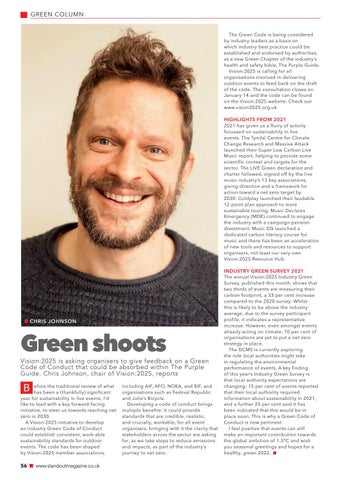GREEN COLUMN The Green Code is being considered by industry leaders as a basis on which industry best practice could be established and endorsed by authorities, as a new Green Chapter of the industry’s health and safety bible, The Purple Guide. Vision:2025 is calling for all organisations involved in delivering outdoor events to feed back on the draft of the code. The consultation closes on January 14 and the code can be found on the Vision:2025 website. Check out www.vision2025.org.uk
HIGHLIGHTS FROM 2021
2021 has given us a flurry of activity focussed on sustainability in live events. The Tyndal Centre for Climate Change Research and Massive Attack launched their Super Low Carbon Live Music report, helping to provide some scientific context and targets for the sector. The LIVE Green declaration and charter followed, signed off by the live music industry’s 13 key associations, giving direction and a framework for action toward a net zero target by 2030. Coldplay launched their laudable 12-point plan approach to more sustainable touring. Music Declares Emergency (MDE) continued to engage the industry with a campaign pension divestment. Music EQ launched a dedicated carbon literacy course for music and there has been an acceleration of new tools and resources to support organisers, not least our very own Vision:2025 Resource Hub.
INDUSTRY GREEN SURVEY 2021
CHRIS JOHNSON
Green shoots
Vision:2025 is asking organisers to give feedback on a Green Code of Conduct that could be absorbed within The Purple Guide. Chris Johnson, chair of Vision:2025, reports
B
efore the traditional review of what has been a (thankfully) significant year for sustainability in live events, I’d like to lead with a key forward-facing initiative, to steer us towards reaching net zero in 2030. A Vision:2025 initiative to develop an industry Green Code of Conduct could establish consistent, work-able sustainability standards for outdoor events. The code has been shaped by Vision:2025 member associations,
56 n www.standoutmagazine.co.uk
including AIF, AFO, NOEA, and EIF, and organisations such as Festival Republic and Julie’s Bicycle. Developing a code of conduct brings multiple benefits: It could provide standards that are credible, realistic, and crucially, workable, for all event organisers, bringing with it the clarity that stakeholders across the sector are asking for, as we take steps to reduce emissions and impacts, as part of the industry’s journey to net zero.
The annual Vision:2025 Industry Green Survey, published this month, shows that two thirds of events are measuring their carbon footprint, a 33 per cent increase compared to the 2020 survey. Whilst this is likely to be above the industry average, due to the survey participant profile, it indicates a representative increase. However, even amongst events already acting on climate, 70 per cent of organisations are yet to put a net zero strategy in place. The DCMS is currently exploring the role local authorities might take in regulating the environmental performance of events. A key finding of this year’s Industry Green Survey is that local authority expectations are changing: 15 per cent of events reported that their local authority required information about sustainability in 2021, and a further 25 per cent said it has been indicated that this would be in place soon. This is why a Green Code of Conduct is now pertinent. I feel positive that events can still make an important contribution towards the global ambition of 1.5°C and wish you seasonal greetings and hopes for a healthy, green 2022.










